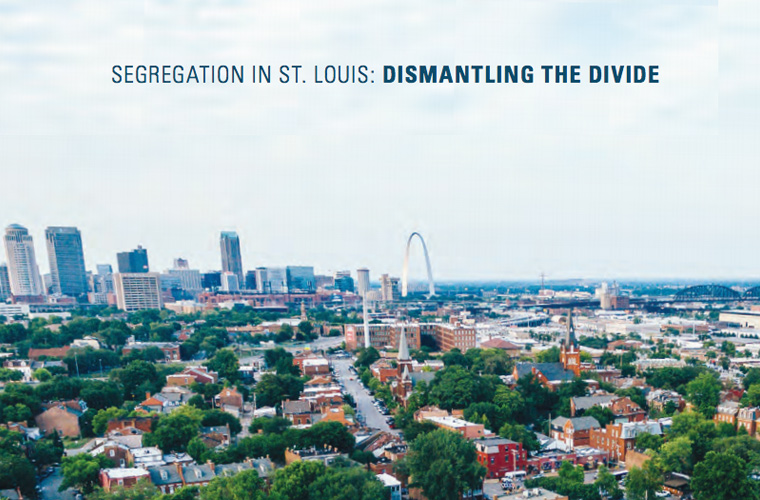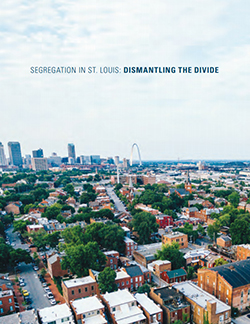A new 115-page community-driven report on segregation and housing in St. Louis was released this week by numerous local partners in the fields of public health, law, fair housing and community development.
“Segregation in St. Louis: Dismantling the Divide” is the product of a collaborative partnership involving ArchCity Defenders, Ascend, Metropolitan St. Louis Equal Housing and Opportunity Council (EHOC), Empower Missouri, For the Sake of All, Community Builders Network, Team TIF, and others.
The downloadable report can be found at www.forthesakeofall.org/segregationinstlouis.
“Segregation in St. Louis: Dismantling the Divide” is a culmination of two years of community meetings and cross-stakeholder collaboration to better foster quality neighborhoods – a priority that originated from the May 2014 report, “For the Sake of All: A Report on the Health and Well-Being of African Americans in St. Louis and Why It Matters for Everyone.”
The new report presents an overview of more than a century of federal, state and municipal policies, real estate practices, and development strategies that have kept far too many of the St. Louis region’s residents segregated in neighborhoods with less opportunity to advance economically and fewer resources to support health and well-being.
It also presents new research on how St. Louis residents of all races and socio-economic backgrounds are often hindered by these significant housing divides that put St. Louis among the top 10 most segregated regions in the country. The report features various indices or regional maps showcasing inequity due to our geography of segregation. Many of these findings are coupled with personal stories of residents in our region coping with housing divides that limit access to quality education, job opportunities, health care, retail, transportation, clean air, empowering social networks and other critical resources.
“We expect the report to both educate and energize the St. Louis community regarding fair and equitable housing,” said Will Jordan, executive director of EHOC. “The report presents recommendations to combat segregation that can be accomplished on the local level. Much of this work is underway, but could benefit from increasing community understanding and mobilized support.”
The report also presents a unique “Index of Exclusivity” that ranks the 41 most exclusionary suburban communities/areas in our region regarding housing inaccessibility for lower-income people and/or African Americans.
“I think many people will be disturbed to see where their communities rank, particularly when they learn of the many policies and practices that went into making them that way,” said For the Sake of All Director Dr. Jason Purnell, associate professor at Washington University. “There is a disturbing history of pervasive policies and practices that established and maintain segregation in St. Louis. We hope that the report educates residents about that history and supports the kind of creative collective action needed to reverse over a century of destructive policy.”
The report concludes with 11 policy recommendations in the areas of affordable housing; equitable development and allocation of resources; and housing and neighborhood stability. Those recommendations support the creation and increased funding of affordable housing trust funds in St. Louis and St. Louis County, the creation of a “greenlining fund” to enable homeownership in neighborhoods that were once “redlined” out of home mortgage lending, tax increment financing reform, investment in a community reinvestment fund, renter protections, eviction prevention, and more.
The report was formally released during a sold-out conference presented by EHOC and For the Sake of All at the University of Missouri-St. Louis recognizing the 50th anniversary of the Fair Housing Act. Richard Rothstein, author of “The Color of Law: A Forgotten History of How Our Government Segregated America,” was the keynote speaker. Students from Grand Center Arts Academy presented films and “ethnodramas” on housing inequity in St. Louis. Roundtable discussions were held to educate and mobilize participants on the report’s recommendations. The event closed with remarks from Dr. Purnell who advocated for creating consciously inclusive communities in our region that embrace equity and inclusion as a powerful asset.
The report was completed with support from Missouri Foundation for Health and Wells Fargo.

